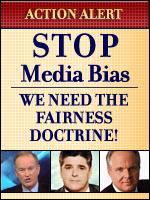
Fairness Doctrine
There has been a call from some asking for a restoration of the fairness doctrine. I really support this idea. The Fairness Doctrine was a standard put in place by the FCC to assure that the public airwaves wouldn't be used to advocated a specific political agenda. There was a fear that those in power, or those with enough money could limit free speech. Oddly, in the 1980's it was decided that the fairness doctrine (basically saying that if you give 1 hour of air time to the democrats, you have to give 1 hour of air time to the republicans) potentially could, somehow, limit free speech. Frankly, I don't get it. How does removing the assurance that both sides of an issue are presented assure free speech? I think we've discovered that the opposite is true.
Shortly after the fairness doctrine was lifted, radio stations filled their programming with republican apologists like Rush Limbaugh and people who take their show daily from the republican party talking points, like Sean Hannity and Bill O'Reilly. Station programmers claim that all this is appropriate because they can sell the ads and the ratings show that the programs are popular. All this may be true. But isn't dialog on the important issues of the day worth an examination of all sides of an issue?
Why are people so much against the fairness doctrine? It is pretty simple. If the fairness doctrine is back in place, Rush, Sean, Bill, Michael and all the other republican apologists either have to stop speaking directly for the republicans, or the stations will have to put on an equal amount of programming that comes straight from the democratic party headquarters. My bet is that the current talk stars would scale it back. Radio wouldn't be able to afford the dip in revenue. Here's the deal. The public good is frequently not cost effective. It is in the public good to provide national defense. No one person can afford a standing army. So we pool resources for the public good. It is also in the public good to assure that the public has access to good, information, showing as many sides of the story as possible. However, people don't like to be challenged. So, good information, fair treatment of issues, is in the public good. Reaffirming your audience's beliefs is very profitable, but doesn't really help with grow informed educated citizens.
I say, bring back the fairness doctrine. It may make afternoon drive-time a little less explosive. But we may become better citizens for it.

